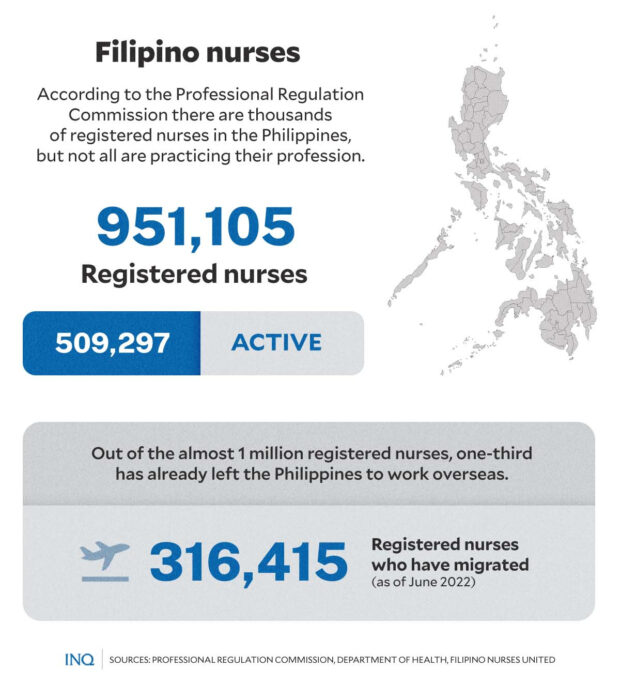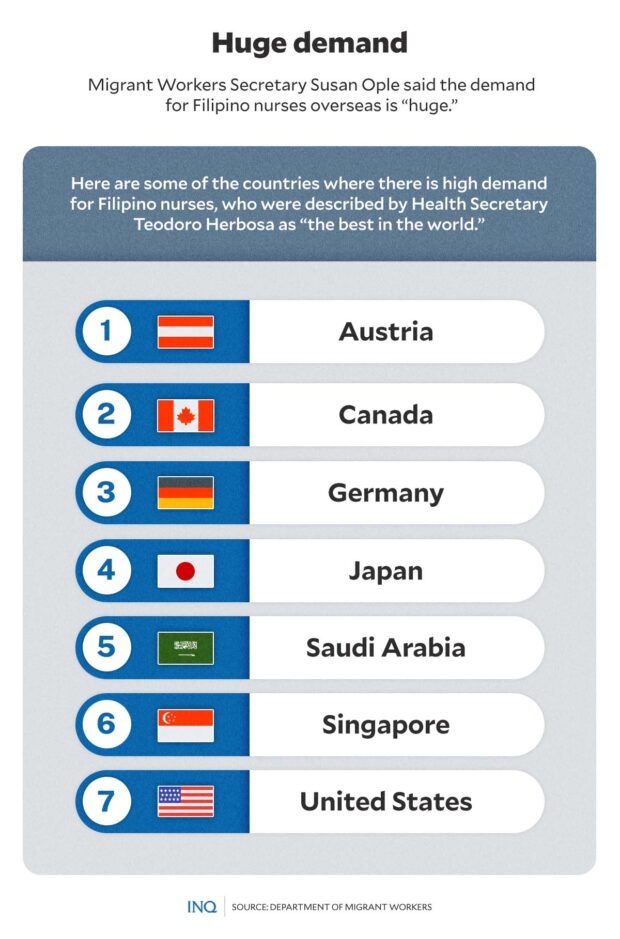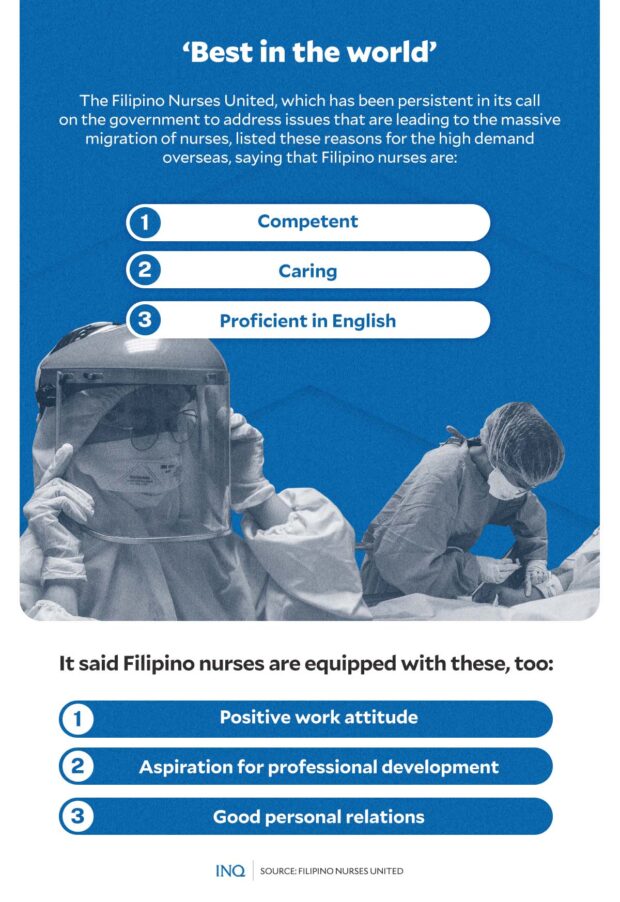Filipino nurses ‘best’ in the world but decent pay, work elusive in PH
MANILA, Philippines—The Philippines has almost a million registered nurses and according to Health Secretary Teodoro Herbosa, they are “the best in the world.”
But many of the “best” already left the Philippines to work overseas for reasons that everyone is already aware of—low pay and excessive work.
The Professional Regulation Commission said there are 951,105 registered nurses, but not all are practicing their profession, with only 509,297 considered as “active.”
Likewise, citing Department of Health (DOH) data, the group Filipino Nurses United (FNU) said 316,415 have already migrated.
As previously narrated by nurses who were interviewed by INQUIRER.net, other countries give what the Philippines cannot, pointing out that opportunities overseas “serve as a rainbow end with a golden pot.”
“We can earn a lot more there than working here,” one of them said.
READ: Nurses’ exodus: Choice obvious between better future abroad, shabby treatment at home
Migrant Workers Secretary Susan Ople said there is a “huge” demand for Filipino nurses overseas, especially in Austria, Canada, Germany, Japan, Saudi Arabia, Singapore, and the United States.
Why? It is because they are “the best in the world,” Herbosa said.
But what is in a Filipino nurse that makes him or her the best and in demand overseas?
‘One of a kind’
Jocelyn Andamo, FNU secretary general, told INQUIRER.net via Viber that Filipino nurses have characteristics “only us have,” pointing out that they are “well known as excellent.”
“Filipino nurses are competent and very caring at the same time,” she said. “We are proficient in English, too.”
According to the Educational Testing Service, a US-based private and non-profit educational testing and assessment organization, “the more proficient you are [in English], the better you can express yourself.”
It explained that as the official language in 53 countries and spoken as a first language by 400 million people, “English is the language of international communication.”
Based on data from the Education First’s 2022 English Proficiency Index, the Philippines is 22nd out of 111 countries with a score of 578.
Likewise, Andamo said Filipino nurses have a “very positive work attitude,” pointing out that they are hardworking and aspiring for professional development.
Most importantly, Filipino nurses have good personal relations which, she said, is “very basic and necessary” when working as a nurse.
Looking back, even British Ambassador Laure Beaufils had told GMA News that Filipino nurses are in high demand because of this mark that they have already carved in the United Kingdom—“malasakit (compassion).”
‘Neglected’ in PH
Based on DOH data, the Philippines is in need of 127,000 nurses to provide optimal health care to people.
However, with an average of 10,635 new registered nurses every year, it would take 12 years to fill the gap.
READ: DOH: It will take 12 years for PH to solve shortage of nurses, 23 years for doctors
As pointed out by Herbosa, the Philippines is in need of the services that only “the best” could provide. He said he does not want Filipino nurses to leave.
But to stop them from leaving, Ople said there should be a serious discussion on how to make local employment attractive.
Based on House Bill No. 4599, the entry-level monthly salary for nurses in the government is P32,097 then P8,000 to P13,500 in private hospitals.
READ: Bill seeks P50,000 monthly pay for public, private nurses
FNU, however, pointed out that in most cases, thousands of government nurses are contractual and get much less than what is provided by the law regarding salary standardization.
Compared to the entry-level pay in the United States ($3,800), United Kingdom (£1,662) and Canada ($4,097), some Filipino nurses said their choice is obvious.
Last year, President Ferdinand Marcos Jr. set the deployment cap of Filipino nurses overseas to 7,000 a year
Deserving of the best
As pointed out by FNU, the only way to make nurses stay in the Philippines is to address the decades-long issues that lead to massive migration.
It said there should be a decent living wage for nurses of P50,000 (entry level) in government and private hospitals.
READ: Lifeline for PH nurses
There should likewise be a safe nurse-patient ratio to address the problem of severe and chronic understaffing. It said all contractual nurses should be regularized.
FNU stressed that while the ideal nurse-patient ratio in hospitals is 1:12, a nurse is taking care of 20 to 50 patients every shift.
“The DOH, being the vanguard of health workers, as they claim to be, must set an example of ensuring that laws are being enforced and implemented for nurses’ welfare,” it said.
“This could very well support nurses and eventually could help retain many nurses who opted to work in the country.”
TSB
Subscribe to INQUIRER PLUS to get access to The Philippine Daily Inquirer & other 70+ titles, share up to 5 gadgets, listen to the news, download as early as 4am & share articles on social media. Call 896 6000.



